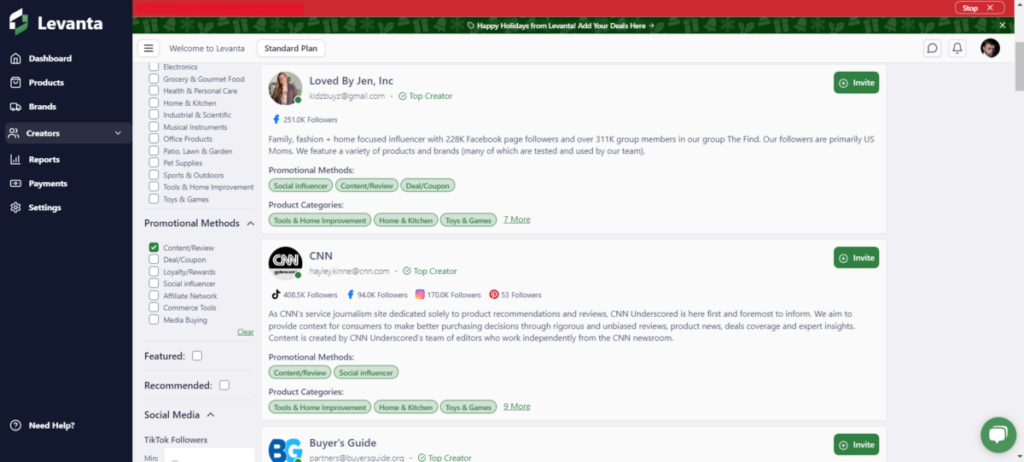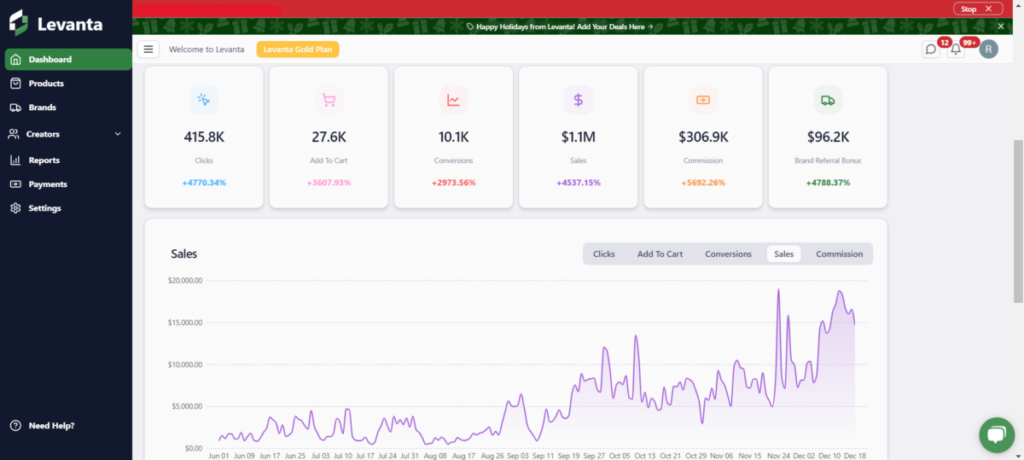
In the tech world, there’s a hypothetical point in the future, called The Singularity, where machine learning causes technological advancement to proceed beyond all human control. Essentially, all progress converges in a single, metaphorical point and technology can take it from there. Here at Influencer Marketing Hub, we’re theorizing a similar, though less sinister, convergence we’re calling Retail Singularity. This will be the point in the future where all commerce goes through Amazon.
Levanta, a new affiliate marketing platform that debuted in early 2023, is what got us (only half) joking about the Retail Singularity. Affiliate marketing platforms are nothing new, not to us and not to Levanta’s founders, Rob Schab and Ian Brodie. Back in 2020, they’d launched Grovia, a “partner marketing agency” created to help brands to recruit and activate affiliates and partners of all stripes. By 2022, they’d attracted many brands, affiliates, and a handful of larger firms looking to buy them out. Grovia sold to Acceleration Partners, a performance marketing agency out of Boston.
As part of their buyout deal, Schab and Brodie took on roles at AP—it was there that a gaping hole in the affiliate platform landscape became apparent to them. Amazon’s Associate Central, one of the biggest affiliate programs in the world, lacked any kind of recruitment mechanism for the sellers. In other words, there was a huge, untapped network of creators out in the world that were driving sales on Amazon—and no way for sellers to connect with them. Getting a referral sale from an Associate was as transparent as winning the buy box (which is to say: it wasn’t transparent at all).
Schab and Brodie thought they could build a platform—and their own affiliate network—on top of Amazon’s Attribution API. Historically, the API was used for advertisers on Amazon to “understand the impact of their non-Amazon marketing strategies on driving Amazon shopping activity.” They brought the idea to the higher-ups at Acceleration Partners, who loved the idea—except they weren’t a tech company with the resources to make such a thing happen. Levanta was born out of this situation, with Schab and Brodie leaving AP (on good terms) to pursue this new business opportunity, a singularly good idea.
Levanta Review:
Pricing
Levanta offers two levels of subscription access to its platform. The lower level is offered as any SaaS offering is, as a monthly payment that can be canceled at any time, or as an annual payment for a discounted price over the 12 months. On the higher end, however, the plans are “termed” and act more like a contract with an agency for a specific period of time.
- Levanta Standard, $150/mo (or $1,440/yr) + 5% of affiliate revenue — Unlimited team members, Unlimited ASINs, creator marketplace with 25 daily creator invites, performance tracking and reporting, payments, 1099 reporting and filing, minimum 20% commission rates
- Levanta Gold, $750/mo + 3.5% of affiliate revenue — All of the above with up to 50 daily creator invites, no minimums on commission, plus: private commissions, branded sign up page for creators, featured product listing, custom contracts and invoicing, priority support, and a Program Success Manager
It’s worth noting here that we normally don’t like it when platforms charge both a monthly fee and a cut of revenue. It strikes as a little much to do both, but Levanta gets more than a pass for reasons that will become apparent in The Details (spoiler alert: it involves the Brand Referral Bonus).
The Details
Getting started with Levanta couldn’t be easier: if you’ve ever logged into your Amazon Seller Central account (you have), then you can integrate your Amazon Seller. That’s because logging into Amazon through Levanta’s integration is pretty much all there is to it. Once you’ve connected your account, all the items in your store and their pertinent data start to import. Once everything is synced, you’ll see these products listed in Levanta. The only thing left to do is assign commission value to each product. Users paying for Levanta Gold can override these product-based commissions to create individual rates for specific creators.
Everything in Levanta seems designed toward ease and simplicity, two words that are not often associated with being an Amazon seller—or affiliate marketing, for that matter. One of the best things about this platform is the way payments toward affiliates are handled. Rather than issue payments one-by-one, or batch hundreds of payments together, Levanta simply invoices you for the total commissions. You pay them once, and they do the work of dividing everything up and getting it to the creators.
Finding creators in Levanta’s network that jibe with your brand is easy, thanks to numerous filters—by product category, by social channel, even by the kind of promotion you want to do— that allow users to sift through the thousands of options available. But before you even get to manual search, the Discover module’s main page lists out some of the platform's top creators, organized into categories: Recommended, Social Influencers, Deal Sites, and Publications. That last category includes some big names, like CNN, USA Today, Wirecutter, and Forbes Advisor alongside more niche publications to give brands a wide range of choices.

Those on the platform aren’t your only choice, though, as you can invite anyone you’d like to become an Amazon Affiliate onto Levanta. Users can create a branded landing page to act as their own recruiting hub. We like Levanta’s approach here, in that it’s just the click of a button to create the page. Whereas other platforms give you tools to customize and design your own page, these tools don’t really help if you’re not a designer. They just make it easier to create something that doesn’t look good. Levanta’s one click page creation is a nice change of pace in this regard—the only gripe we can say here is that the user’s branding isn’t as noticeable in the design as Levanta’s, which could confuse creators.
With your affiliates activated, the only things left to do is really to sit back and let them take it from there. You’ll be able to track their success with Levanta’s excellent reporting. Even the dashboard you first see on login gives plenty of excellent info across the board, showing every stage of the customer journey, from how many people clicked on your affiliate’s link through how many times someone added an item to the cart to whether they actually bought it and then all the resulting revenue and commissions. Within the reporting module itself, you can breakdown the stats in a number of ways, so you can see overall performance as well as reports organized by product, brand, and creator.

Finally, let’s cover that last stat you see above, Brand Referral Bonus. This right here is why we aren’t mad about Levanta taking a cut of revenue as part of their pricing. The Brand Referral Bonus is essentially found money that Levanta users would otherwise not have easy access to. This is because the BRB is an incentive for bringing in sales from outside of Amazon. For Sellers to earn it they need to use Amazon ads to market themselves on other websites and bring the sale to Amazon. Amazon Associates, as affiliates, are also eligible to earn this bonus. The reason these are the only two groups eligible is because the BRB is only able to be calculated when the traffic comes through the Attribution API (which attributes the sale to someone).
Because Levanta’s whole platform uses this API to connect with Amazon, every sale goes through this API, attributing the sale to you, the user—not the affiliate. The bonus is a percentage of revenue generated, and that percentage varies based on the product and category. All told though, the total bonus tends to hover around 10% of revenue, plus or minus. This is money you wouldn’t have gotten unless you bought Amazon ads, an investment of about $50 to $100 a day, plus the time it takes to research and target audiences, to be successful. With Levanta, you get this bonus for the cost of access to the platform—your affiliates will do the work of targeting customers for you. When you’re getting ~10% in bonus revenue, you can spare 3.5%-5% for the folks who helped you get it.
Integrations
Levanta doesn’t need to integrate with anything other than Amazon, and so that’s the integration it offers. This is another tool in your Amazon arsenal, rather than the central platform of your business. CRMs, accounting, analytics platforms, and other extras should all be integrating with your Amazon store—not your affiliate marketing platform.
Conclusion
We’re big fans of ideas that are so obvious they make us mad we didn’t think of them (it’s complicated). Levanta is just such an idea. Affiliate marketing exists. Amazon stores exist. And Amazon Associates, an affiliate marketing program for Amazon, exists. But those last two are locked down behind Amazon’s policies and restrictions. The creators of Levanta didn’t reinvent the wheel, so much as they figured out a way to let anyone use some previously inaccessible wheel. It’s a smart solution to a great idea.
-
Features
-
Ease of Use
-
Reporting



